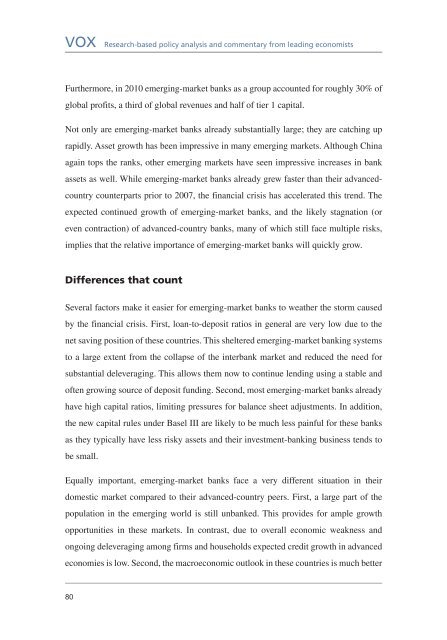Create successful ePaper yourself
Turn your PDF publications into a flip-book with our unique Google optimized e-Paper software.
VOX Research-based policy analysis and commentary from leading economists<br />
Furthermore, in 2010 emerging-market banks as a group accounted for roughly 30% of<br />
global profits, a third of global revenues and half of tier 1 capital.<br />
Not only are emerging-market banks already substantially large; they are catching up<br />
rapidly. Asset growth has been impressive in many emerging markets. Although China<br />
again tops the ranks, other emerging markets have seen impressive increases in bank<br />
assets as well. While emerging-market banks already grew faster than their advancedcountry<br />
counterparts prior to 2007, the financial crisis has accelerated this trend. The<br />
expected continued growth of emerging-market banks, and the likely stagnation (or<br />
even contraction) of advanced-country banks, many of which still face multiple risks,<br />
implies that the relative importance of emerging-market banks will quickly grow.<br />
Differences that count<br />
Several factors make it easier for emerging-market banks to weather the storm caused<br />
<strong>by</strong> the financial crisis. First, loan-to-deposit ratios in general are very low due to the<br />
net saving position of these countries. This sheltered emerging-market banking systems<br />
to a large extent from the collapse of the interbank market and reduced the need for<br />
substantial deleveraging. This allows them now to continue lending using a stable and<br />
often growing source of deposit funding. Second, most emerging-market banks already<br />
have high capital ratios, limiting pressures for balance sheet adjustments. In addition,<br />
the new capital rules under Basel III are likely to be much less painful for these banks<br />
as they typically have less risky assets and their investment-banking business tends to<br />
be small.<br />
Equally important, emerging-market banks face a very different situation in their<br />
domestic market compared to their advanced-country peers. First, a large part of the<br />
population in the emerging world is still unbanked. This provides for ample growth<br />
opportunities in these markets. In contrast, due to overall economic weakness and<br />
ongoing deleveraging among firms and households expected credit growth in advanced<br />
economies is low. Second, the macroeconomic outlook in these countries is much better<br />
80














